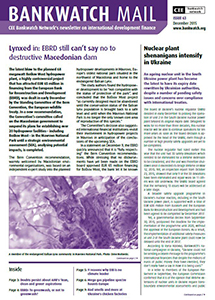EU-backed fossil fuels binge needs to end in ‘neighbourhood’ countries

Bankwatch Mail | 17 December 2015
Bankwatch has been taking a look at EU financing for the energy sector in 16 European Neighbourhood countries between 2007 and 2014 in order to compare the support provided to unsustainable energy sources (such as fossil fuels and nuclear power) against that provided to renewables and energy savings initiatives. Our aim has been to better understand the impact of energy sector investments in the region in light of European Neighbourhood Policy (ENP) commitments regarding the upholding of common values such as democracy and human rights, the rule of law, good governance, market economy principles and sustainable development.
This article is from Issue 63 of our quarterly newsletter Bankwatch Mail
Browse all articles on the right
Alarmingly, though, our research has uncovered that out of at least EUR 9 billion provided by the EU to energy projects in the ENP region during the period under assessment, more than EUR 4.2 billion in financing went to hydrocarbons in contrast to the EUR 1.5 billion awarded to low carbon sources of energy and energy efficiency projects.
The most significant amount of lending over the period – EUR 5.6 billion – derived from the European Investment Bank (EIB), and EUR 3.2 billion from the ‘EU’s bank’ supported 17 fossil fuel projects.
Meanwhile the European Bank for Reconstruction and Development (EBRD) has channelled financing across a wide-ranging mix of fossil fuels and renewable energy projects, including greenfield hydros, and energy efficiency projects. The bank has also supported a nuclear safety upgrade programme in Ukraine that is necessary for extending the lifetime of expired nuclear units for up to 20 years beyond their initially projected lifespan. In total for 2007-2014 the EBRD provided EUR 991 million to fossil fuels in ENP, with a discernible shift being made towards gas, as seen with its EUR 500 million loan to Lukoil for the extraction of gas in Azerbaijan and a EUR 182 million loan for the Damanhour gas power plant in Egypt, both made in 2015.
Find out more
A range of materials on the the European Neighbourhood countries and the EU’s energy interests.
The new Bankwatch research also confirms that in the Middle East and North Africa region, as well as in the Eastern Partnership region, there is an urgent need for comprehensive energy sector reform in order to improve energy efficiency and intensity, not to mention environmental sustainability.
However, EU energy investments have a pronounced tendency to not serve the interests of local economies and populations. Rather, with such a bias towards fossil fuels, these investments impact negatively on the social, economic and environmental rights of local communities, including their adverse air and water pollution impacts, while the usually opaque land acquisition and involuntary resettlement ‘packages’ that accompany so many fossil fuel carbuncle projects – most often, too, without proper compensation – only increase poverty.
In addition, unconditional support to countries such as Azerbaijan and Egypt in order to ensure the EU’s energy security agenda serves to solidify the authoritarian regimes within these countries and worsens the human rights situation.
In its recent Communication “Review of the European Neighbourhood Policy” published just last month, the European Commission emphasised that energy cooperation has “a greater place in the ENP, both as a security measure (energy sovereignty) and as a means to sustainable economic development”, therefore it should “support greater energy independence through support to diversification of energy sources” and “better cooperation on energy efficiency, and transition to the low carbon economy”.
The Communication also underlines, however, that initiatives “such as establishing gas reverse flow capacity to Ukraine, completing the Southern Gas Corridor and making best use of the new energy discoveries while assessing and preventing potential risks are important to achieving pan-European energy security”. This only sounds like the achingly familiar rationale for continuing down the high fossil fuels investments road. Moreover, given this most recent ENP communication’s strong emphasis on stabilisation of the neighbourhood, without a clear and strong human rights framework further support to large scale – and, therefore, usually fossil fuel – energy projects may lead towards the further shrinking of civil society’s space in a region all too well-known for abuses of local people’s socio-economic rights.
The energy investment numbers in the ENP region to date do not lie, and thus it is crucial that the revised ENP, in its Energy security and Climate chapters, reflects the needs of and demands of the countries and ensures, first and foremost, significant funding increases for renewables and energy efficiency. Support should also be extended for energy reforms in individual countries, increased transparency and environmental safeguards in line with the EU’s long-term decarbonisation agenda and the UN Sustainable Development Goals. The European Parliament is expected to vote on the new ENP Communication in Spring 2016.
Find out more
A range of materials on the the European Neighbourhood countries and the EU’s energy interests is available at: https://bankwatch.org/ENP-energy
Theme: Energy & climate | Social & economic impacts | Development
Location: Egypt | Jordan | Morocco | Tunisia | Ukraine | Georgia
Tags: BW Mail 63 | ENP | European neighbourhood | fossil fuels | neighbourhood policy
Never miss an update
We expose the risks of international public finance and bring critical updates from the ground. We believe that the billions of public money should work for people and the environment.
STAY INFORMED

